
ABOUT THE AUTHOR
George Yancy is professor of philosophy at Emory University. He is the author, editor, and coeditor of over eighteen books. He is known for his influential essays and interviews in the New York Times philosophy column, The Stone. He resides in Atlanta, Georgia.
BACKLASH
Published by Rowman & Littlefield
A wholly owned subsidiary of The Rowman & Littlefield Publishing Group, Inc.
4501 Forbes Boulevard, Suite 200, Lanham, Maryland 20706
www.rowman.com
Unit A, Whitacre Mews, 2634 Stannary Street, London SE11 4AB
Distributed by NATIONAL BOOK NETWORK
Copyright 2018 by Rowman & Littlefield
All rights reserved . No part of this book may be reproduced in any form or by any electronic or mechanical means, including information storage and retrieval systems, without written permission from the publisher, except by a reviewer who may quote passages in a review.
British Library Cataloguing in Publication Information Available
Library of Congress Cataloging-in-Publication Data
978-1-5381-0405-7 (cloth)
978-1-5381-0406-4 (electronic)
 The paper used in this publication meets the minimum requirements of American National Standard for Information SciencesPermanence of Paper for Printed Library Materials, ANSI/NISO Z39.481992.
The paper used in this publication meets the minimum requirements of American National Standard for Information SciencesPermanence of Paper for Printed Library Materials, ANSI/NISO Z39.481992.
Printed in the United States of America
This book is dedicated to all of those who are willing to take the risk to love.
FOREWORD
The End of White Innocence
Cornel West
G eorge Yancy is one of the few distinguished public philosophers willing to get his hands dirty in the muck and mire of white supremacy in contemporary America. He possesses impeccable credentials in academic continental and American philosophy, yet he also has chosen to intervene in our escalating swamp of polarized discussions of racism. The age of Trumpwith its open neofascist presences, the collapse of civic public discourse, and the increase of market-driven punditshas promoted a massive white backlash against any attempt to address the scope, depth, and breadth of white supremacy.
This courageous book is a crucial form of fightback against the backlash. Yancys prophetic voice is a force for good in our post-hope era in which fake news is most of the news, machismo poses and postures drown out any ethics of no edges, and rapacious narcissism undercuts any ontology of connectedness. Yancy gallantly tries to wrestle with what it means to be human in a time in which vulgar and visceral dehumanization predominates.
Like the inimitable James Baldwin, Yancy begins with tough love and calls for the end of white innocence. This innocence is a kind of self-delusion which denies vulnerability, risk, and reciprocity. It parades as an insecure arrogance and willful ignorance that aides and abets crimes against humanity. And let us not forget that white supremacy, like male supremacy and other horrific evils, is a crime against humanity. Just as the cowardly and vicious white supremacist backlash against Yancys letter of tough love was a crime against him.
Ironically, Yancy begins with a strong critique of himselfof his own sexism and patriarchal socialization. Yet these crude and rude times have little space or patience for self-critique or irony. Instead, the avalanche of white hatred and contempt overflows and overwhelms Yancys bid for understanding. His hermeneutical humility is toppled by hermeneutical breakdown. Yet he persists with a philosophical tenacity to get at the ugly truths of white supremacy. Needless to say, he pays a heavy costwith dignity and determination.
My major challenge to Yancys powerful and insightful text is that we get only small glimpses of what white maturity or white courage looks like. The supportive remarks of white readers for his brave words dont do justice to a long yet too thin tradition of white radicals who, like Yancy, risk their lives and careers for truth and justice. Nevertheless, this book is a brook of fire through which all of us must past.
ACKNOWLEDGMENTS
T hanks to Jon Sisk, vice president and senior executive acquisitions editor at Rowman & Littlefield, for sharing with me his powerful response when he first read Dear White America when it appeared at the New York Times column, The Stone. I was honored by his response, one that was honest and heartfelt. His response came at a time when it was greatly needed. In the midst of the storm and crucible of such a magnitude of white racist responses, Jons message functioned as a place of hope. I thank you for that, Jon. I also thank you for your encouragement that I rethink Dear White America in the form of a book. This was truly the impetus for bringing this book to fruition. I would also like to thank Kate Powers, assistant editor at Rowman & Littlefield, for all of her help with logistics, and her insight and professionalism. To Crystal Clifton, my copy-editor, thanks so very much for your insights, keen eyes, and thoroughness. The care with which youve worked on this book is much appreciated. And Elaine McGarraugh, senior production editor at Rowman & Littlefield, thanks for your wonderful assistance, enthusiasm for the book, and for making sure that I kept to the schedule.
A special thanks to philosopher Cornel West for writing the Foreword to this book. Cornel, I know that you are out there fighting the good fight, but you took the time to come through for your dear brother. Your voice, one grounded within a long and sustained prophetic tradition, is truly needed as America and the world spiral down into greater catastrophe and ruin. Yet your indefatigable hope convinces me to hold on and never allow despair to have the last word.
Thanks to philosopher Simon Critchley and editor Peter Catapano at the New York Times , cofounders of The Stone, who believe in the power of public philosophical discourse and dialogue. My work with Simon and Peter is a genuine honor. Peters editorial work is brilliant. And his capacity for mutual understanding is greatly appreciated. So, to Simon and Peter, thanks for seeing the value in publishing the initial version of Dear White America. From the overwhelming and torrential response that it received, I have no doubt that we did something right, something momentous. Thanks for creating such a welcoming space to engage in public philosophy, especially at a time when the need for informed, critical, and honest dialogue about a range of deep political, ethical, global, and existential issues is under emboldened malicious and irresponsible attack from within our very nation.
Emma Clements, an editor par excellence, is to be thanked for her time, her expertise, and her meticulous editorial skills. She is one of the best editors with whom Ive had the pleasure of working. Emma, thanks for what you do, and the powerful creative ingenuity that you possess.
I also thank Barbara Applebaum, Taine Duncan, Karen Teel, Maureen OConnell, and Susan Hadley for all of their critical feedback and willingness to read over various chapters. Barbara, your friendship and profound pedagogical insights within the areas of critical whiteness studies and complicity pedagogy are deeply appreciated. Taine, your philosophical probing is deeply engaging and was instrumental in shaping important aspects of this book. Thanks for making time for my work, for grappling with my voice, for improving my insights. Karen, your thoroughness was amazing and helped to bring me to the finish line. Thank you for taking the time in giving so much of yourself. Maureen, thanks for making time to read through parts of this text. You immediately said yes when asked. For that Im thankful. Susan, you read through the entire text, literally sitting with me going over, pouring over, the text in detail. You provided essential advice while, of course, respecting my philosophical voice, my style of engaging a concept, a word, a sentence. That can be a task. Thanks for honing my voice, especially when I metaphorically soared too close to the sun. What I needed was the smell of the earth as Adrienne Rich would demand. Thanks for keeping me grounded, honest, and true to my own philosophical aims within this text. Cassie Hill, a young philosopher on the rise, thanks for reading through the manuscript during a tight schedule. You are destined to be a philosopher who distinguishes herself.
Next page

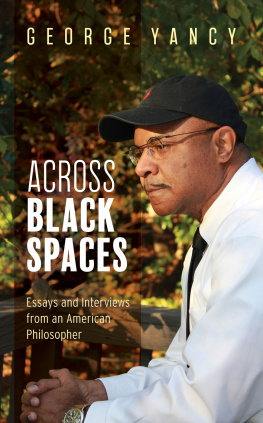
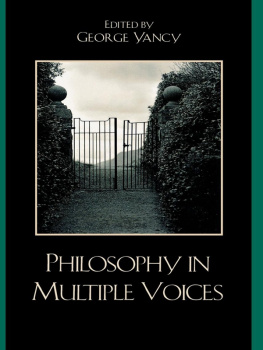
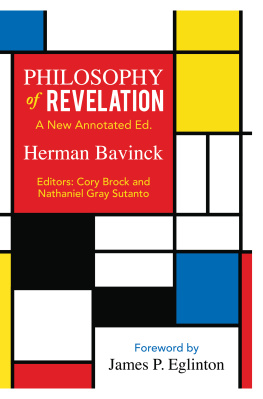
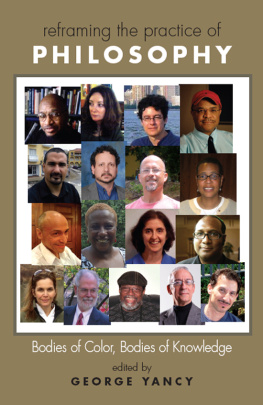
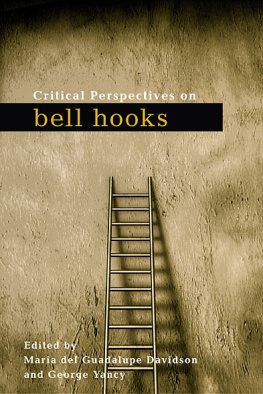
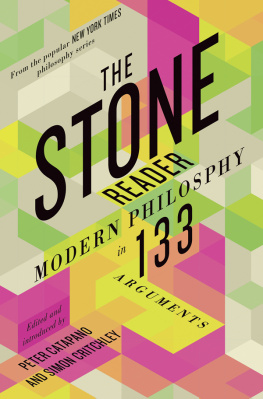
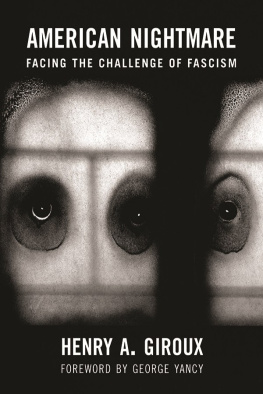
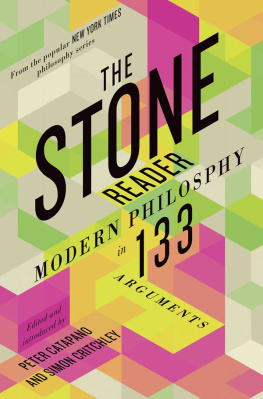
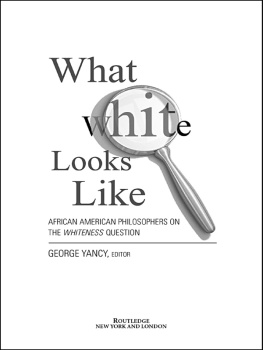

 The paper used in this publication meets the minimum requirements of American National Standard for Information SciencesPermanence of Paper for Printed Library Materials, ANSI/NISO Z39.481992.
The paper used in this publication meets the minimum requirements of American National Standard for Information SciencesPermanence of Paper for Printed Library Materials, ANSI/NISO Z39.481992.